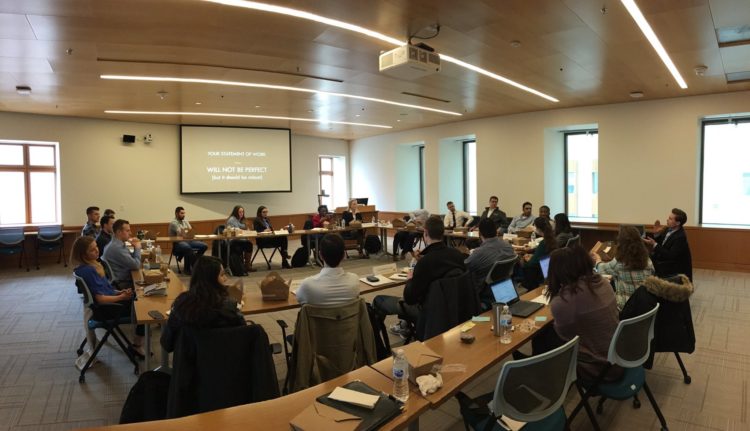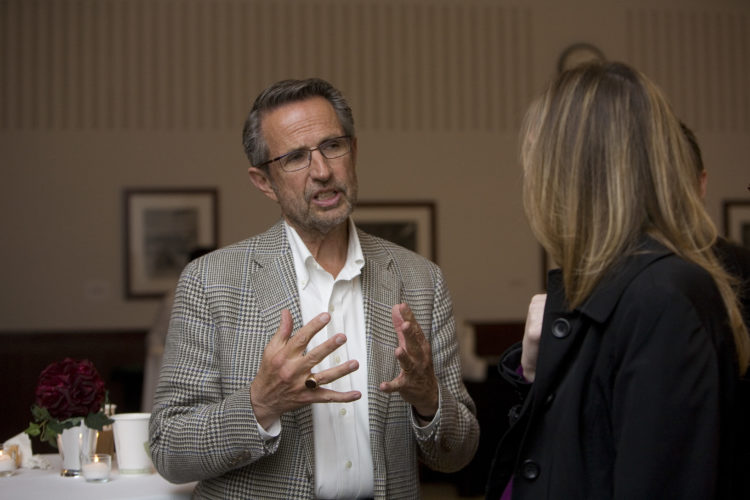Allison Halpern, BSBA ’18, wrote this post on behalf of Bauer Leadership Center.
Last week, the Bauer Leadership fellows discussed the challenges and responsibilities of a leader. All fellows are MBA students serving as Center for Experiential Learning team leads for a project within their practicum program. In this role, they need to manage relationships with their teammates, mentors, and clients.
To navigate these winding roads successfully, they collaborated and role played tough situations to understand how to solve problems and create impact as a leader. To extend this conversation beyond the meeting walls, I wanted to share their words of wisdom here to continue building values-based leaders here at WashU.
Communicate Early; Set Goals; Manage Expectations
Many fellows discussed coming into a team with prior friendships with other members. Established relationships can be difficult to break, especially if you are coming into a role as a superior with a team of fellow students. It is important to set the goals up front for you as a leader and other team members in various roles to give them freedom and leadership.
This allows everyone to have responsibilities where they can shine. It also grounds you with a sense of authority and respect.
And these conversations go beyond the team, too. Each group has a mentor to guide them through the practicum. They are there for guidance and to provide a more experienced perspective, but making sure they are doing this properly can be difficult.
Taylor Ohman, previous CEL team lead and BLC Fellow, said it well: “This is the Center for Experiential Learning—the point is to work through the struggles and learn how to do better.”
With this in mind, its important for this mentor to let students solve problems to learn and grow in this safe space.
Take on the Responsibility of the Team
As one of the fellows said it, be a “leader servant.” Leaders will get much of the praise when things go well—and all of the brunt if they don’t. If another teammate is having an off week, it is on the leader to pick up the slack.
And if nitty-gritty administrative work needs to be done, it is important for the leader to pick up on it to allow the rest of the team to focus on the parts that matter most to them. As a leader, it is your job to bring the best out of your team.
Sometimes, that means doing the not-so-glamorous work and taking the fall when things go wrong. But it’s also important to know how to bounce back.
Adapt, Improvise, and Shift Plans, If Needed
Of course, you can set goals and take on hard responsibilities, but some things just might not go as you thought—and that’s OK. As a leader, it is critical to learn how to act on your feet and continually manage performance.
If someone is not performing up to par, discuss it with this person in a direct, mature, and decisive manner. Improvise on what their responsibilities are to provide tasks that can be benchmarks for success. Every team member will work differently, so work to understand these differences to create a cohesive team dynamic.




 The Bauer Leadership Fellows Program provides experiential leadership development for team leaders who lead CEL practicum teams. Recently, the BLC fellows had the opportunity to go to Creve Coeur Lake for a leadership development rowing retreat. BLC fellows reflect back on what they took away from the rowing experience.
The Bauer Leadership Fellows Program provides experiential leadership development for team leaders who lead CEL practicum teams. Recently, the BLC fellows had the opportunity to go to Creve Coeur Lake for a leadership development rowing retreat. BLC fellows reflect back on what they took away from the rowing experience.



